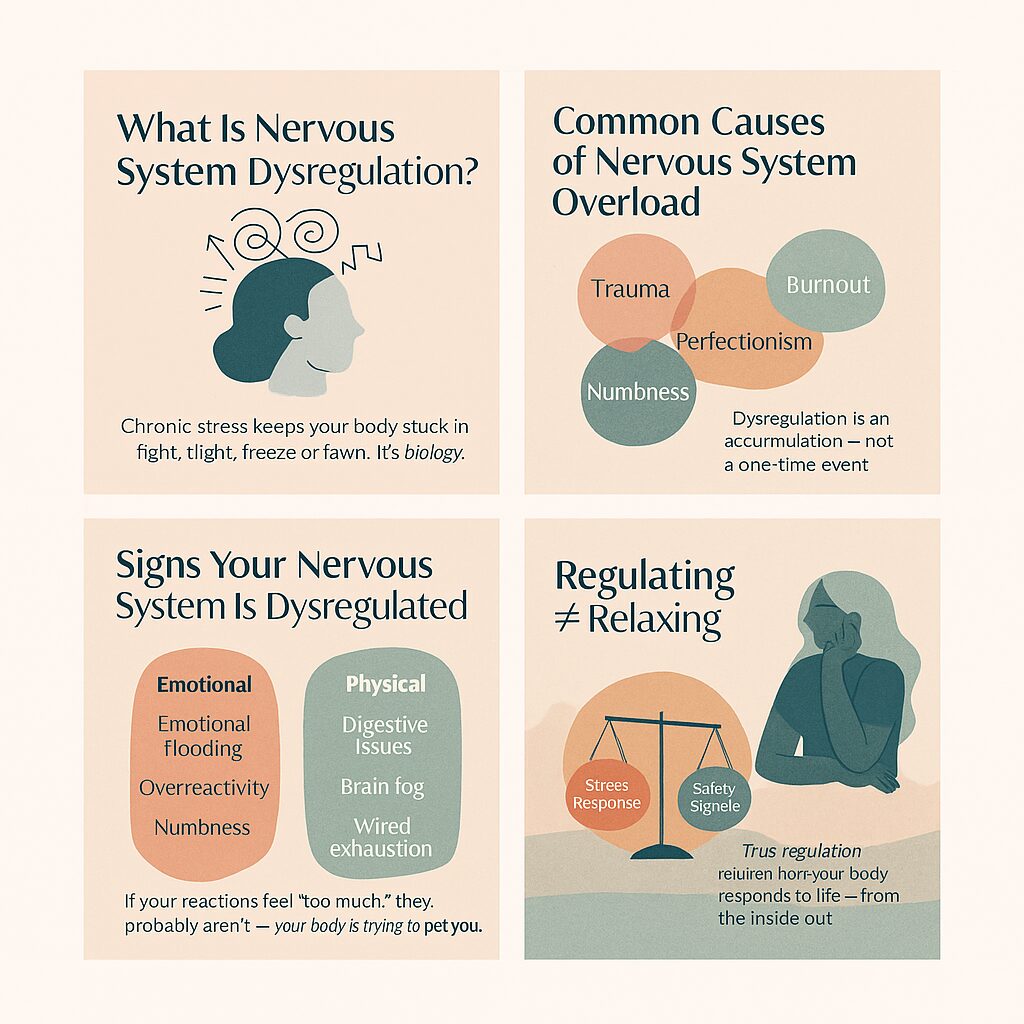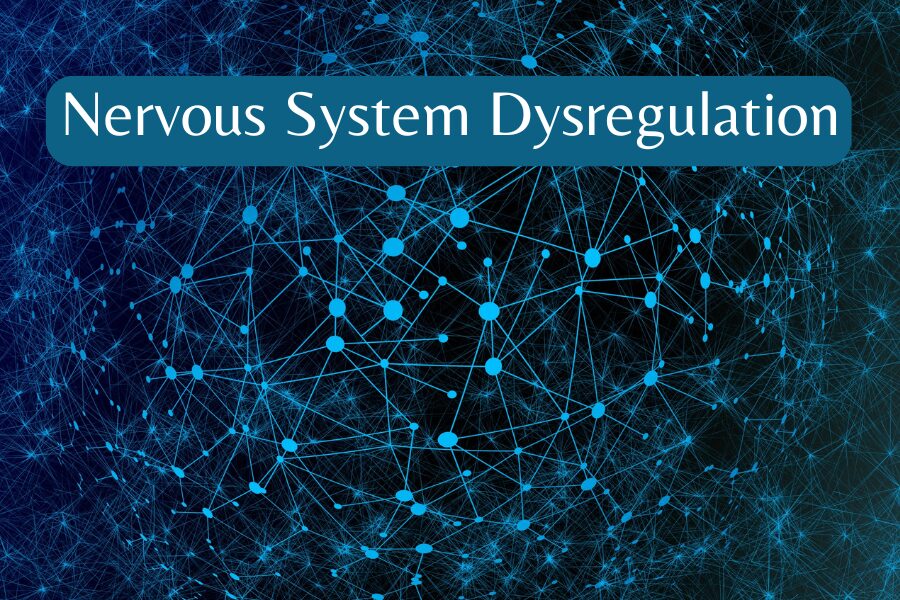“Why am I reacting so strongly to something so small?”
If you’ve ever asked yourself that question, you’re not alone — and you’re definitely not broken.
What you’re experiencing could be a sign of nervous system dysregulation, a physiological state where your body becomes stuck in stress mode.
This post will help you:
- Understand what nervous system dysregulation really is
- Recognize the signs in your own body and life
- Identify what causes this dysregulation — especially for high-performing, sensitive women
- Learn how to support and heal your nervous system sustainably.
What Is Nervous System Dysregulation?
Your nervous system is your internal command center. It quietly manages your heart rate, digestion, energy levels, breathing, and emotional reactions — every moment of the day.
When you face a stressor (a conflict, a deadline, a tough conversation), your body activates your autonomic nervous system, which triggers a fight, flight, freeze, or fawn response.
Normally, when the threat passes, your body should return to calm.
But when stress becomes chronic — or when your system doesn’t feel safe — that switch gets stuck. You stay in survival mode.
This is nervous system dysregulation.
You may experience:
- Constant tension or emotional reactivity
- Overwhelm from minor events
- Brain fog, exhaustion, or digestive issues
- Feeling “on edge,” disconnected, or numb
It’s not a mindset problem.
It’s not weakness.
It’s your biology doing what it learned to do — protect you.

What Causes Nervous System Dysregulation?
While every woman’s experience is unique, there are common root causes that I see again and again in my practice — especially among sensitive, high-achieving women.
- Chronic, low-grade stress
You don’t need to experience a major trauma to become dysregulated. Constant small stressors — endless emails, notifications, meetings, family demands — add up. Over time, your body forgets what calm feels like. - Early life patterns
If you grew up in an environment where emotions weren’t safe (either too chaotic or too rigid), your system may have adapted by staying in a state of alertness. That childhood programming still runs in your body today. - Unprocessed trauma
This includes both “big-T” trauma (accidents, violence, loss) and “small-t” trauma (emotional neglect, rejection, chronic stress at work). Trauma leaves a lasting imprint on the nervous system, keeping it hyper-alert long after the event. - The culture of overachievement
High performers often learn to override their needs to meet expectations — pushing through fatigue, ignoring emotions, avoiding rest. Over time, this depletes the nervous system and leads to burnout. - Lack of recovery rituals
Rest isn’t just sleep. We need moments of intentional regulation throughout the day — true pauses that tell your system: you are safe now. Without these rituals, your nervous system never fully resets.

How Do I Know If I’m Dysregulated?
Nervous system dysregulation doesn’t always look dramatic.
It often shows up in small, quiet ways that you might dismiss or blame on yourself.
Here are some common signs:
- Symptom How It Shows Up
- Emotional flooding You cry, panic, or shut down unexpectedly
- Brain fog You can’t think clearly even with rest
- Digestive discomfort Bloating, tension, or IBS-like symptoms
- Overreacting You feel out of control from small triggers
- Numbness You feel emotionally “flat” or disconnected
- Anxiety or panic Racing thoughts, shallow breathing
- Wired exhaustion You’re tired but can’t fully rest or sleep
If this sounds familiar — your nervous system may be stuck in a loop of survival.
How Can I Regulate My Nervous System?
Regulation doesn’t mean living in bliss.
It means having the ability to return to safety when life challenges you — which it inevitably will.
Here are the key foundations for nervous system healing, and why they matter:
- Vagal Tone and Safety
Your vagus nerve is the main communication line between your body and brain. When it functions well, it sends clear signals that “you are safe.”
Improving vagal tone helps you:
- Recover faster from stress
- Lower background anxiety
- Regulate your heart rate and digestion
- Feel emotionally grounded in daily life
In short: the better your vagal tone, the more resilient you become.
- Body Awareness and Somatic Grounding
When you’re stuck in your head, your body gets ignored — even though it’s holding the stress.
Building somatic awareness helps:
- Release stored tension from past stress
- Interrupt patterns of anxiety and overthinking
- Anchor your mind back into the present moment
- Rebuild the foundation of self-trust in your own body
This is why body-based work is essential in trauma-informed healing.
- Deep Rest and True Relaxation
Real restoration doesn’t come from distraction — it comes from conscious, parasympathetic rest.
Deep relaxation:
- Recharges your nervous system’s energy reserves
- Balances hormones impacted by stress (like cortisol)
- Improves mental clarity and sleep quality
- Supports emotional balance throughout your day
When rest becomes a skill, recovery becomes possible.
- Emotional Literacy and Attunement
Many of us were taught to minimize, suppress, or hide our feelings.
But what the nervous system really needs is emotional safety.
Emotional attunement allows you to:
- Process feelings instead of bottling them
- Reduce internal pressure and overreaction
- Feel more in control of your state and your day
- Increase compassion toward yourself and others
Naming your emotions actually calms your nervous system.
- Protecting Your Energy with Boundaries
If your energy feels constantly drained, chances are — your boundaries need support.
Boundaries give your nervous system:
- Time and space to recover
- A sense of protection and control
- Permission to say “no” without guilt
- Freedom from overfunctioning or people-pleasing
Boundaries are not walls. They are invitations to safety.
Ready to Regulate Your Nervous System for Real?
Here’s the truth: no two nervous systems are the same.
What works for someone else might leave you feeling overwhelmed or unseen.
That’s why personalized support matters.
In my free 45-minute consultation, I help you:
- Identify your unique signs of dysregulation
- Understand the root causes shaping your current stress patterns
- Receive a personalized roadmap to regulate your system — based on science, compassion, and your real-life context
You don’t need another generic tip list.
You need to feel safe in your body — again and again.
👉 Book your free session now and let’s begin your healing journey — one calm breath at a time.
Book your complementary session: https://bit.ly/47QTFyj
Together, we can identify the root causes of your dysregulation and personalize a plan to enhance your mental resilience.
To your Well-being
By Marta Raga, Executive & Life Coach Specializing in Stress Management









0 Comments